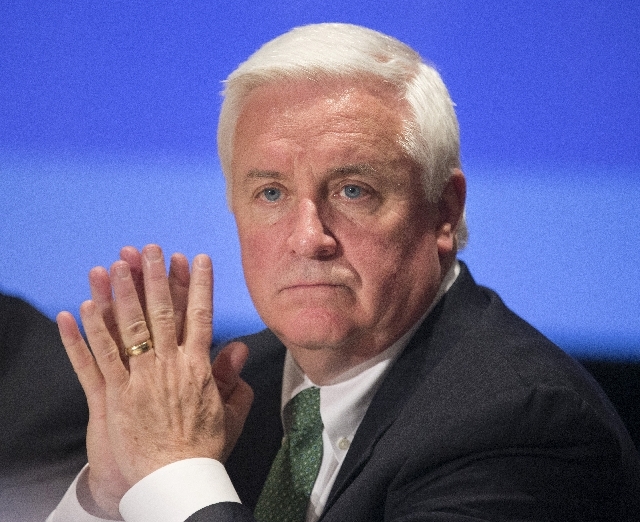Judge tosses lawsuit by Pennsylvania governor against NCAA

HARRISBURG, Pa. — A federal judge on Thursday threw out the Pennsylvania governor’s lawsuit against the NCAA over sanctions against Penn State related to Jerry Sandusky, calling his argument “a Hail Mary pass” that easily warranted dismissal.
U.S. Middle District Judge Yvette Kane’s decision puts an early end to the antitrust lawsuit Gov. Tom Corbett filed in January in which he sought to overturn a $60 million fine, a four-year bowl ban, scholarship limits and other penalties.
She said she could not “find any factual allegations supporting (Corbett’s) allegation of ‘concerted action’ that might nudge its conspiracy claim into ‘plausible’ territory.”
The NCAA said it was “exceedingly pleased” and hoped the ruling would help heal divisions caused by the Sandusky scandal. Corbett’s office said it was working on a statement.
Kane said that even if the penalties make it harder for Penn State to recruit quality football players, that would not make it an antitrust case.
“The fact that Penn State will offer fewer scholarships over a period of four years does not plausibly support its allegation that the reduction of scholarships at Penn State will result in a market-wide anticompetitive effect, such that the ‘nation’s top scholastic football players’ would be unable to obtain a scholarship in the nationwide market for Division I football players,” Kane wrote.
She said the questions the case raises are important matters of public debate but are not antitrust grounds.
“In another forum the complaint’s appeal to equity and common sense may win the day, but in the antitrust world these arguments fail to advance the ball,” Kane said.
Sandusky, a former university assistant football coach, is serving a decades-long prison sentence for sexual abuse of 10 boys. He has maintained his innocence.
Penn State, which agreed to the NCAA penalties, was not a party to the case.
Kane produced a “thorough analysis and thoughtful opinion,” said Donald Remy, the NCAA’s chief legal officer.
“Our hope is that this decision not only will end this case but also serve as a beginning of the end of the divide among those who, like Penn State, want to move forward to put the horror of the Sandusky crimes behind the university and those who want to prolong the fight and with it the pain for all involved,” Remy said.
During arguments last month, the NCAA’s lawyer said the sanctions were not likely to harm the overall market for higher education or for top-flight football players. He said antitrust law did not apply and that the organization acted to enforce rules about honesty, sportsmanship and conduct.
Relatives of the late Joe Paterno, who was Sandusky’s boss for decades, five Penn State trustees and others connected to the university have filed their own lawsuit against the NCAA in county court. That suit also seeks to overturn the NCAA sanctions.
Wick Sollers, a lawyer who represents the Paterno family, said their lawsuit against the NCAA raises “significantly different claims and legal theories.”
State College area state Sen. Jake Corman, who sponsored a law Corbett signed in February that requires $60 million NCAA fine to be spent exclusively in Pennsylvania, is pursuing a Commonwealth Court lawsuit against the association over the use of the money. An NCAA challenge of that law is still pending before Kane in federal court.